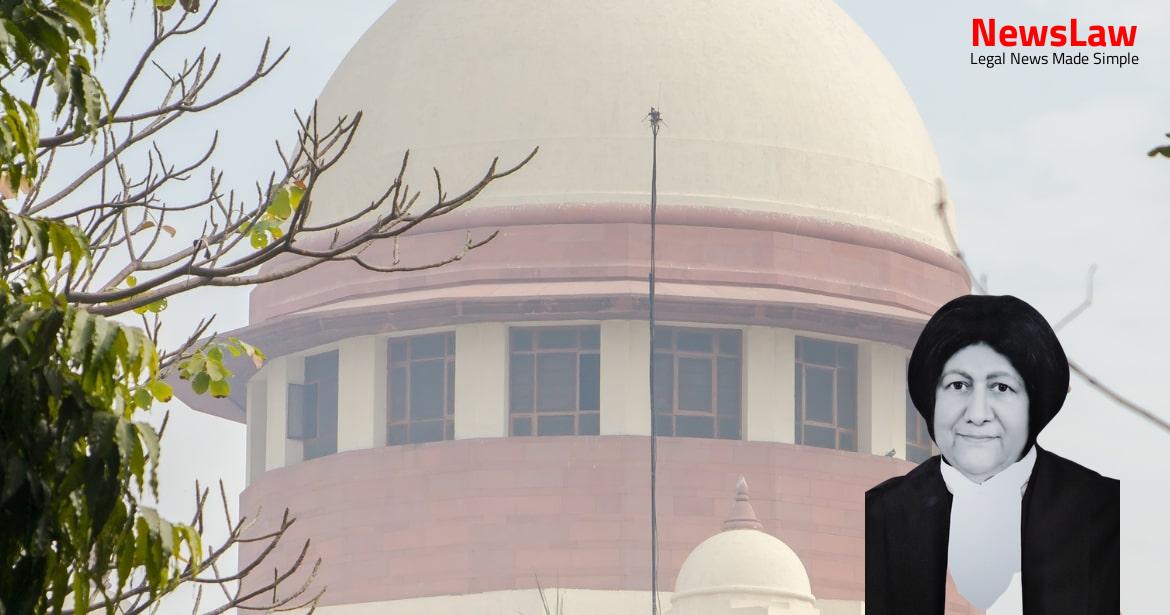Delve into the profound legal analysis conducted by the court regarding tax rate discrepancies in tender processes. The court scrutinized the clauses related to GST, emphasizing the indirect nature of the tax. It discussed the responsibility of the suppliers regarding GST payment and liability. Further examination was made on the inclusion of HSN Codes in tenders and its significance under the ‘Make in India’ policy. The court’s analysis focused on the requirements and procedures under the GST regime for evaluating offers and tax structures. Stay tuned to grasp the nuances of the court’s legal perspective on this crucial matter.
Facts
- The Writ Petitioner raised concerns regarding the GST rate specified by different bidders in a tender for the procurement of products.
- L1 bidder showed a GST rate of 5%, while the Writ Petitioner quoted 18% GST, leading to a significant difference in total prices.
- The Writ Petitioner sought directions from the court to ensure uniformity in bidding, correct HSN Codes, and a level playing field for all bidders.
- The Writ Petitioner’s complaint highlighted discrepancies in GST rates and the need for clarifications on the procurement product’s HSN Code.
- Preference under the ‘Make in India’ Policy for projects with a minimum of 50% local content was also discussed.
- Entities like L1, importing products, and quoting lower GST rates, were compared to the Writ Petitioner in terms of pricing and compliance.
- Specific respondents were named in the Writ Petition, including L1, L2, L3, and others, and their actions were scrutinized.
- The high court directed the General Manager of Diesel Locomotive Works to address the issues raised by the Writ Petitioner and ensure fair procurement processes.
- The Court questioned the procedure adopted by the appellants.
- The High Court defined the limitations on the Court’s power of judicial review.
- Opening the subject tender was deemed impossible due to the expired offer period from the interim High Court order.
- The Court cannot scrutinize the details of a commercial contract.
- Bid documents specified that GST should be deducted from the successful tenderer’s bid under the reverse charge mechanism.
- Disparity in total prices offered due to different GST rates affects fair competition.
- Mentioning the HSN Code is necessary to determine the applicable GST rate.
- The Court can examine the decision-making process for reasonableness, rationality, and non-arbitrariness based on previous judgments.
Also Read: Interpretation of Custody in Contempt of Court Case
Arguments
- The writ petitioner argues that the High Court’s direction aims to establish a level playing field in state largesse distribution, aligning with Article 14 principles.
- The petitioner believes that Section 168 of the Goods and Services Act supports the High Court’s decision.
- The writ petitioner asserts that the burden of tax disclosure should lie with the bidder for fairness in the bidding process.
- There is contention over the correct HSN Code and GST rate being crucial for transparency and equal treatment of bidders.
- The writ petitioner highlights the importance of honesty in tax rate declarations and accuses some bidders of unfair trade practices.
- The writ petitioner argues against the impracticality and dispute-generating nature of the High Court’s directions.
- The petitioner’s case revolves around discrepancies in tax rates disclosed by different bidders affecting the bidding process.
- The petitioner emphasizes the need for clarity and certainty regarding tax rates and HSN Codes for fair evaluation in tender processes.
- A reliance on Circulars and statutes is debated, with the petitioner highlighting the enforcement of honesty in tax declarations for fair competition.
- The writ petitioner expresses concern over the wide disparity in tax rates quoted by different bidders, leading to an unfair bidding scenario.
- The writ petitioner contends that the correct HSN Code and tax rate are essential to determine local content.
- The argument is countered by the ASG stating that ‘local content’ definition excludes domestic indirect taxes.
- The writ petitioner’s claim regarding HSN Code for customs duty calculation and GST is deemed fallacious.
- The second respondent is found to be L1 for 593 pieces of turbo wheel impeller balance assembly.
- First contention: Division Bench cannot issue a mandamus to direct a public authority on discretion.
- The second respondent argues in favor of allowing the appeal.
- Writ petitioner argues for identical classification and tax rate for similar products.
- A Chartered Engineers’ Certificate and diagram were produced.
- The complexity of the product dispute is highlighted, indicating oversimplification in the direction given.
Also Read: Enforcement of Arbitral Award – Court’s Legal Analysis
Analysis
- The court analyzed the clauses related to GST in detail
- The court emphasized the indirect nature of GST as an imposed tax
- Discussion on the responsibility of the supplier regarding GST payment and liability
- Reference to specific clauses and provisions under GST Act for advance ruling
- Clarification on the inclusion of HSN Code in tenders and its relevance under the Make in India policy
- Examination of the requirements and procedures under GST regime for evaluation of offers and tax structure
- Analysis of the bidder’s responsibility to quote correct HSN numbers and GST rates
- Discussion on different rates quoted by bidders and the evaluation process based on GST rate
- Article 19(1)(g) confers the fundamental right to carry on business to a company.
- Decisions or acts resulting in unequal and discriminatory treatment violate the ‘level playing field’ doctrine in Article 19(1)(g).
- Courts have limited interference in tender processes unless actions are proven arbitrary or unreasonable.
- Public interest and prudence must be considered in the application of the ‘level playing field’ doctrine.
- Courts cannot interfere with tender terms unless they are arbitrary, discriminatory, or malicious.
- The terms of tender are generally not open to judicial scrutiny unless they are arbitrary, discriminatory, or malicious.
- Standards in judicial review must align with constitutional principles governing public power.
- Courts can only interfere with government policy if it is entirely capricious, lacking reasons, or arbitrary.
- Courts may issue writs of mandamus to compel lawful exercise of discretion by the government or public authorities.
- Section 168 of the State Act (Uttar Pradesh) grants the Commissioner the power to issue instructions or directions for uniform implementation of the Act.
- The Commissioner specified in various sections of the Act shall exercise powers with the approval of the Board.
- Purchasers are not responsible for taxes paid by suppliers based on misunderstandings of the law or misclassification.
- Tenderers must familiarize themselves with applicable taxes and duties, and if not explicitly indicated in their offer, it will be considered as inclusive.
- Section 9(3) allows the Government to notify categories for reverse charge tax levy.
- High Courts have the power to issue directions, orders, or writs for enforcing Fundamental Rights or other purposes.
- Article 226 is designed with wide language to reach injustice and mold relief based on the country’s requirements.
- Successful tenderer must pay the tax due and correctly quote the GST rate to avoid tax evasion.
- All contracts awarded by the appellants must be forwarded to the concerned jurisdictional Officer.
- Tenderer should include the tax component with the correct rate of tax in the contract document.
- Instructions should be given by the first appellant regarding this matter.
- Appellants have a valid case for interference with the impugned Judgment.
- Supplier of goods and services is responsible for paying GST through filing returns and self-assessment.
- Officer dealing with the supplier holds jurisdiction in the matter.
Also Read: Supreme Court’s Analysis on Advocates On Record System
Decision
- The appellants must indicate in the tender documents that the tenderers will provide details of their Assessing Officers in their bids.
- The Union of India and the Railway Board must ensure that this direction is followed by all units.
- The appeal is allowed, the impugned judgment is set aside, and the appellants are directed to comply with the directions in paragraph-61 of the judgment.
- No costs are awarded.
- The appellants are ordered to effectively comply with this direction.
Case Title: UNION OF INDIA Vs. BHARAT FORGE LIMITED (2022 INSC 837)
Case Number: C.A. No.-005294-005294 / 2022



